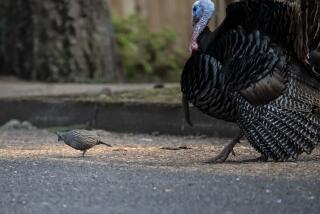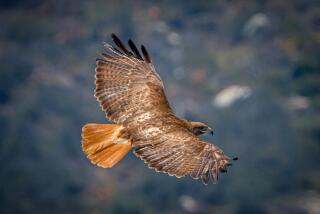Season over? They don’t squawk, they quack : Hunters while away the winter perfecting a cacophony of duck calls that can drive you quackers.
- Share via
MILLARD, Neb. — Down in the exhibit hall. Over in the conference room. Behind the doors where the board of directors meets. Even in the toilet. The racket at the recreation center here gets so earsplitting sometimes that you would swear the whole place had gone quackers.
“Quack-quack-quack-quack.” “KWAAAAAAHK. KWAAAAAHK. KWAAAAAAHK.” “KeeeewwaaAAAAAK. KeewwwaaAAAHHHHuuuk.” “Qwk. Qwk. Qwk. Qwk.”
There are basically two kinds of creatures on this Earth that make duck sounds--ducks and the people who hunt ducks. The reason that ducks do it is fairly obvious. The reason that people do it takes a little explanation.
Every autumn, millions of hunters spend millions of dollars and millions of hours in the pursuit of ducks. They seed lakes and rivers with floating plastic replicas of ducks and sit shivering in camouflaged boats or blinds until flocks of the real things come flapping by. They blow into little wooden instruments that emit duck-like noises and hope the ducks are stupid enough to fall for it and come close. They then fire away. They like doing this.
The rest of the year, such activities are forbidden. So all that is left for die-hard duck hunters to do is to prepare themselves for the battles to come. And that’s where the big noise from Millard (not Mallard) comes in.
Each February, a booster group called the Duck Callers Assn. of Nebraska throws a series of seminars to help hunters in the Cornhusker State hone their duck-calling skills. “They’ve just gone through the duck hunting season, and the memory of the ducks they missed is still fresh in their minds,” explained squawk tutor Jim James of the demand for such sessions. “Besides, what else is there to do in the winter?”
The venue for the programs is the remotely situated headquarters pavilion of a conservation district west of Omaha. The remoter the better, because the duck call din gets so deafening someone might call the police if this were going on in town.
As James demonstrated in a recent lecture, the lingua ducka of this art form is a complex one. Along with the basic quack, students are drilled in variations ranging from the “red-hot shingle-rattling highball” (a Klaxon-like bleat designed to get a duck’s attention) to the “feed chuckle” (a softer series of staccato burps). There is also the “itty bitty hen (th-th-th),” the “lonesome hen (heh-heh-heh)” and the raspy “comeback” whine used to nag retreating ducks into turning around (waaaaAAAAAAHHHH, waaaaAAAAAAHHHH).
The secret is to manipulate tongue, teeth, larynx, lungs, hands and cheeks until the blower resembles something like Dizzy (Daffy?) Gillespie trying to wail on a kazoo.
There really is a higher purpose to the instruction than learning how to raise a more skilled ruckus. Association officials say their goal is to instill a conservation ethic among hunters by enhancing their abilities to spare females needed to propagate the species.
“You don’t have to blast away at everything,” James explained. “If you know the calls, you can work the birds like a kite on a string. When you get them in at 10 or 15 yards instead of 60, you can tell the hens from the drakes and you get a cleaner kill with fewer cripples.”
Students, many of whom are veterans of several refresher courses, insist that learning to expand their duck-like vocabulary has also added a new dimension to the sport. “I might call in seven or eight flocks before I shoot a single bird,” said Myron Andrews. “I get so engrossed in the calling I just don’t shoot as much as I used to.”
The sessions have boasted more than 600 graduates since they began in 1985. One of the up-and-comers this year was 10-year-old Ryan Smith, who drove 200 miles round- trip to attend. Actually his mother, Sue, did the driving, and she swears she didn’t mind even though Ryan practiced his technique much of the way. “I’m half-deaf, probably,” she admitted.
Practicing does pose some problems, since decibel levels emitted by duck calls can exceed the rock concert variety. People from big families sometimes are exiled outside to their cars. Doug Noller, the duck group’s vice president, said he prefers to use the bathroom when he can get away with it. “It’s so much better in the john,” he explained. You’ve got all those tiles in there and it reverberates. The sounds are great.”
More to Read
Sign up for The Wild
We’ll help you find the best places to hike, bike and run, as well as the perfect silent spots for meditation and yoga.
You may occasionally receive promotional content from the Los Angeles Times.






